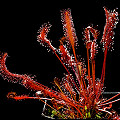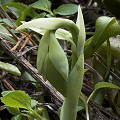Q: What are cultivar-groups?

Drosera capensis 'Mars'

Darlingtonia 'Othello'
A: Cultivar-groups are, well, groups of cultivars! Let me give you some (fake)
examples. Suppose you were a hybridizer of Sarracenia, and were working
on developing hybrids with marvelously frilly lids. You developed a hybrid
that was so nice you established it as a cultivar named
Sarracenia 'Frilly Willy'. Then, suppose later on you developed
another cultivar that you called Sarracenia 'Compact Crenelations.'
Suppose you wanted to note that both these cultivars are part of your
program of frilly-lid hybridization. You could register the name of a
"cultivar-group" just as you registered your cultivar names.
(For the sake of our fantasy, let us say you called it the Wavy Wonder
cultivar-group.)
If, later, you made another frilly lidded hybrid that fit this group, you could
note that it should also be considered part of the Wavy Wonder cultivar
group. If you called this new plant Sarracenia 'Wide Wiggles' you would
have three members of this cultivar-group, namely:
Sarracenia (Wavy Wonder Group) 'Frilly Willy'
Sarracenia (Wavy Wonder Group) 'Compact Crenelations'
Sarracenia (Wavy Wonder Group) 'Wide Wiggles'
You could also write them as:
Sarracenia 'Frilly Willy' (Wavy Wonder Group)
Sarracenia 'Compact Crenelations' (Wavy Wonder Group)
Sarracenia 'Wide Wiggles' (Wavy Wonder Group)
You register cultivar-group names with The International Carnivorous Plant Society
just as you register cultivar names. Go to
the home page for the International Carnivorous Plant Society and download
registration forms and instructions.
A few other notes about cultivar-groups. A plant can belong to more than one cultivar groups. So if your
Sarracenia 'Compact Crenelations' is a dwarfed plant, you could
specify it is also a member of the Dwarf cultivar-group, if such a cultivar-group existed. Also,
depending upon how broadly you define a cultivar group, someone else could add a cultivar to
"your" cultivar group. So do not get too proprietary about the names!
A real-life example of a carnivorous plant cultivar group is the Dentate Traps cultivar group for
Dionaea. This cultivar group includes all the Dionaea
cultivars that have shortened, triangular teeth, such as
Dionaea 'Dentate Traps',
Dionaea 'Sawtooth', and
Dionaea 'Red Piranha'.
Page citations: Brickell, C.D. et al. 2004;
Rice, B.A. 2000; Trehane, P. et al. 1995.